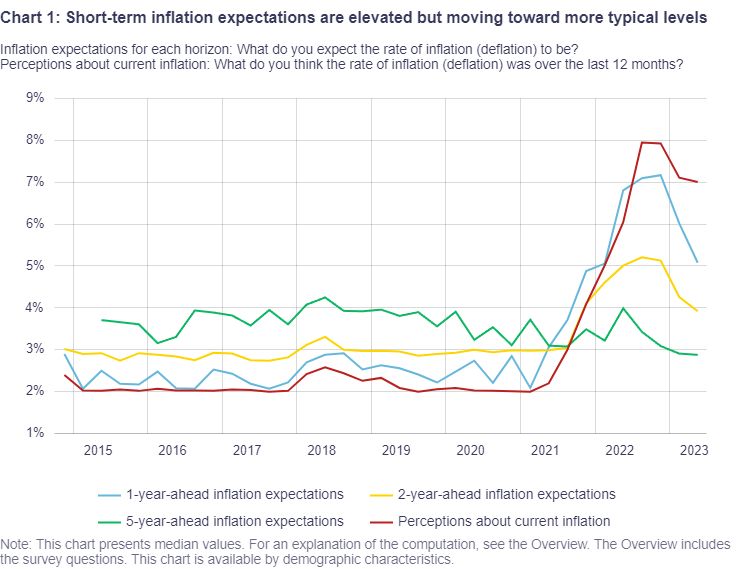Last week included several data releases that were noteworthy for anyone keeping an eye on Canadian mortgage rates.
On Tuesday, Statistics Canada confirmed that our Consumer Price Index (CPI) rose by 3.4% on an annualized basis in May. This result was well below our rate of 4.4% in April and marked our headline CPI’s lowest rate since June 2021.
While that big drop in headline inflation was welcome news to mortgage borrowers, it had little impact on Government of Canada (GoC) bond yields, which our fixed mortgage rates are priced on, or on the bond market’s prevailing bets on more Bank of Canada (BoC) rate hikes this year.
A closer look at the details shows why:
- The CPI drop was substantial, but it was also widely anticipated (and therefore already priced in).
- Almost all the drop in our May CPI was attributed to base effects, which occur when higher prices from a year ago roll out of our CPI data set (because it tracks prices over the most recent 12 months on a rolling basis).
- Most of the decline was attributed to gas prices, which were 18.9% lower than last spring when they were spiking in response to Russia’s invasion of Ukraine. This disinflationary tailwind won’t last for much longer – gas prices normalized late last summer.
- Our CPI increased by 0.4% month-over-month (MoM) in May following a 0.7% increase in April. There is still plenty of inflation pressure in the here and now.
- The BoC’s most closely watched measures of core inflation (CPI-trim and CPI-median), which strip out volatile food and energy price inputs and other short-term noise in the data, are still a little below 4%.
Then, on Friday, Stats Can provided our latest GDP data.
After flatlining in April, it is now estimated that our GDP increased by 0.4% MoM in May.
That new surge in growth is another sign of resilience, but there are also reasons to question whether it has a sustainable base:
- Our GDP growth is being boosted by record levels of immigration. Our overall GDP is growing but our GDP per capita, the data that individual Canadians “feel”, is declining.
- Canadian labour productivity has declined for four straight quarters. This raises costs and weakens our competitive position.
- Much of our surprise momentum in May came from the real-estate sector, and most of that likely dissipated in June following the BoC’s surprise rate hike and the dramatic rise in fixed mortgage rates that accompanied it.
- Our GDP is being buoyed by high levels of government deficit spending, which cannot be sustained forever.
Last Friday, the BoC also released the data from its latest Business and Consumer Surveys for the second-quarter 2023.
The latest Business Outlook Survey (BOS) confirmed that businesses “expect weak sales growth” and that many are planning only “modest increases” to their capital expenditures “due to weakened demand prospects.”
That doesn’t portend improving productivity on the horizon.
When it comes to corporate pricing, which is an element that the BoC is laser focused on right now, the latest BOS confirmed that “some firms are planning to make larger and more frequent price increases than usual in the coming year … because they have not yet finished passing through the cost increases they experienced during the pandemic.”
With firms planning less investment and more price increases, it makes sense that “a greater number of firms than in the first-quarter 2023 survey think it will take five years or more for inflation to return close to 2%”. The BoC doesn’t want business leaders to think they’ll have to wait that long.
The latest Survey of Consumer Expectations showed that while Canadian consumers lowered their expectations about the future path of inflation when compared to the previous survey, those expectations are still well above their pre-pandemic levels (see chart).

In somewhat of a contradiction, wage growth expectations “remain near survey highs”, but at the same time, consumers also expect that interest rates will fall over the next twelve months (and when that happens, they expect house prices to continue rising).
On balance, last week’s data releases probably increase the likelihood that the BoC will hike again in July.
Inflation fell, but only because of base effects from a year ago. Average prices are still rising at more than double the Bank’s 2% target if we annualize our CPI’s MoM growth rates in April and May.
The BoC has likely seen enough real-time data to know that our real-estate activity slowed in June, but if consumers are still bullish about house prices, real-estate demand is likely to rebound quickly in the absence of more BoC rate hikes.
For now, the sharpest series of rate hikes over the past thirty years still doesn’t appear to have done enough to reduce inflation by reducing demand and slowing the economy.
As near as I can tell, that’s because factors such as record immigration, residual pandemic savings, and variable-rate mortgages which extend mortgage amortization periods rather than increase monthly payments, are, as CIBC economist Andrew Grantham puts it, “disrupting the normal transmission between interest rates and spending”.
For as long as that is the case, the BoC will likely continue to tighten its monetary-policy torniquet.
Fixed mortgage rates are holding steady now. The next catalyst for change could arrive on Friday when Stats Can releases its latest employment report. Anyone who is potentially in the market for a mortgage today is well advised to lock in a pre-approval before then.
Variable mortgage rate discounts were unchanged last week. For the reasons outlined above, I think variable-rate borrowers should be prepared for another 0.25% hike by the BoC when it next meets on July 12 (but I must reserve the right to change my mind if Friday’s jobs report is much weaker than expected).
David Larock is an independent full-time mortgage broker and industry insider who works with Canadian borrowers from coast to coast. David's posts appear on Mondays on this blog, Move Smartly, and on his blog, Integrated Mortgage Planners/blog.
July 5, 2023
Mortgage |



.jpg?width=883&height=328&name=Rate%20Table%20(July%203%2c%202023).jpg)
